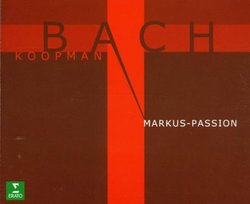Contreversial, Yet Undeniably Beautiful
R. Gerard | Pennsylvania USA | 02/24/2002
(5 out of 5 stars)
"A listener and reviewer must not examine this Markuspassion reconstruction outside of its context.Undeniably (to most) this is a very beautifully recorded Passion. The wonderful, clean articulation is to be expected by Koopman, a favorite in the field of Baroque music.This is a reconstruction of the last of Bach's five known Passions:
(1) The first was a St. John Passion whose music has been lost along with its libretto (We know this because Bach reused a few arias from this "Weimar Passion" in his newer St. John Passion, the one we know today.)
**(Note: this one is not to be confused with the four early versions of the surviving St. John Passion.)**
(2) The second was a St. Matthew Passion written also in Weimar, a far less ambitious Passion using a single chorus. It was found in 1790 by Carl Phillip Bach but has since been lost without a trace.
(3) St. John's is the oldest surviving intact.
(4) St. Matthew's is the second surviving, and the most famed.
(5) And St. Mark's is the last, yet only the libretto of the St. Mark Passion survives. Its music has been long since lost, or so we thought. The St. Mark Passion was definitely composed circa 1730 as a parody, that is, a newer composition based on an older composition. It was common for Bach to request a from a librettist, literature that would fit meterically under the vocal line of composition as to replace the original literature. (For example, The "Crucifixus" from Bach's B-Minor Mass is modeled after "Weinen, Klagen" from his Cantata BWV 12. Whereas the opening chorus "Laufet Frohlocket, Auf Preiset die Tage" from the Christmas Oratorio is modeled after the cantata "Toenet, ihr Pauken Erchallet, Trompeten" [notice the meterical similarities in the words and syllables.]) Bach requested from the librettist, Picander (incidently the librettist of the St. Matthew Passion) that the his newest Passion would be one of these parodies. He ordered the Markuspassion to be modeled after the funeral cantata, "Lass, Fuerstin, Lass noch einen strahl," also know as "Trauerode". Other arias would be modeled after those in BWV 7 and 54, and certain turba choruses after those in the Christmas Oratorio.Examine the meterical similarites between the first lines of both of the libretti of the "Trauerode" and the "Markuspassion":"Lass, Furstin, Lass noch einen strahl!" -Trauerode
"Geh, Jesu, Geh zu deiner pein!" -Markuspassion
(both first lines of the opening choruses. )Despite this undebatable fact, Koopman decides to find other ways to reconstruct the St. Mark Passion, parodying from various, random cantatas, and in effect, the meterical organization is not convincable, in fact, it is horrible. Despite this, the music of Bach and the interpretation of Koopman makes up for the awkward vocal fittings.Koopman claims to know the architecture of Bach recitative, but this prooves false. The only flaw in any attempt to recreate the St. Mark Passion lies in the recitative, since recitatives are never parodied. But Koopman's "recitative in the style of Bach" is not believable. But who can ever match the architecture and symbolism of Bach recitative? For this reason, Koopman's attempt in this particular area is forgivable. (I felt the recording, for this reason, deserved Four, not five, stars. But I didn't feel it deserved such a low TOTAL rating).In consequence, this should NOT be taken as a genuine performance, but a study by Koopman on the practice of parody and his OWN personal vision of a St. Mark Passion. This should be taken rather as a compilation of Bach's works into one which is brilliantly conducted by Ton Koopman. Reccomended, but be open-minded of what exactly you are buying."
Nice try, but I'm keeping your cigar
H. Hyten | Texas | 12/07/2000
(2 out of 5 stars)
"All right, it was curiosity that impelled me to buy this set without attempting to get a listen first. What Bach-lover wouldn't want another worthy Passion to add to his collection, even the reconstruction of a long-lost score? Well, maybe one day, but this recording is certainly not it!This St. Mark reconstruction doesn't really even sound like Bach to me, even in the recitatives whose authenticity Mr. Koopman claims were the result of years of playing the real thing. And very unfortunately, the bulk of the recording consists of recitatives, though I've not timed them; perhaps it just seems that way. The arias and choruses, though based on other Bach works, do not inspire me. Granted, the gauge by which I judge poor Mr. Koopman is perhaps the greatest composer who has yet lived. Still, it was Vater Bach who provided the basis and framework for Mr. Koopman's success or failure; with such a leg up, I expected more!... and so I vote with a mere two."


 Track Listings (29) - Disc #1
Track Listings (29) - Disc #1